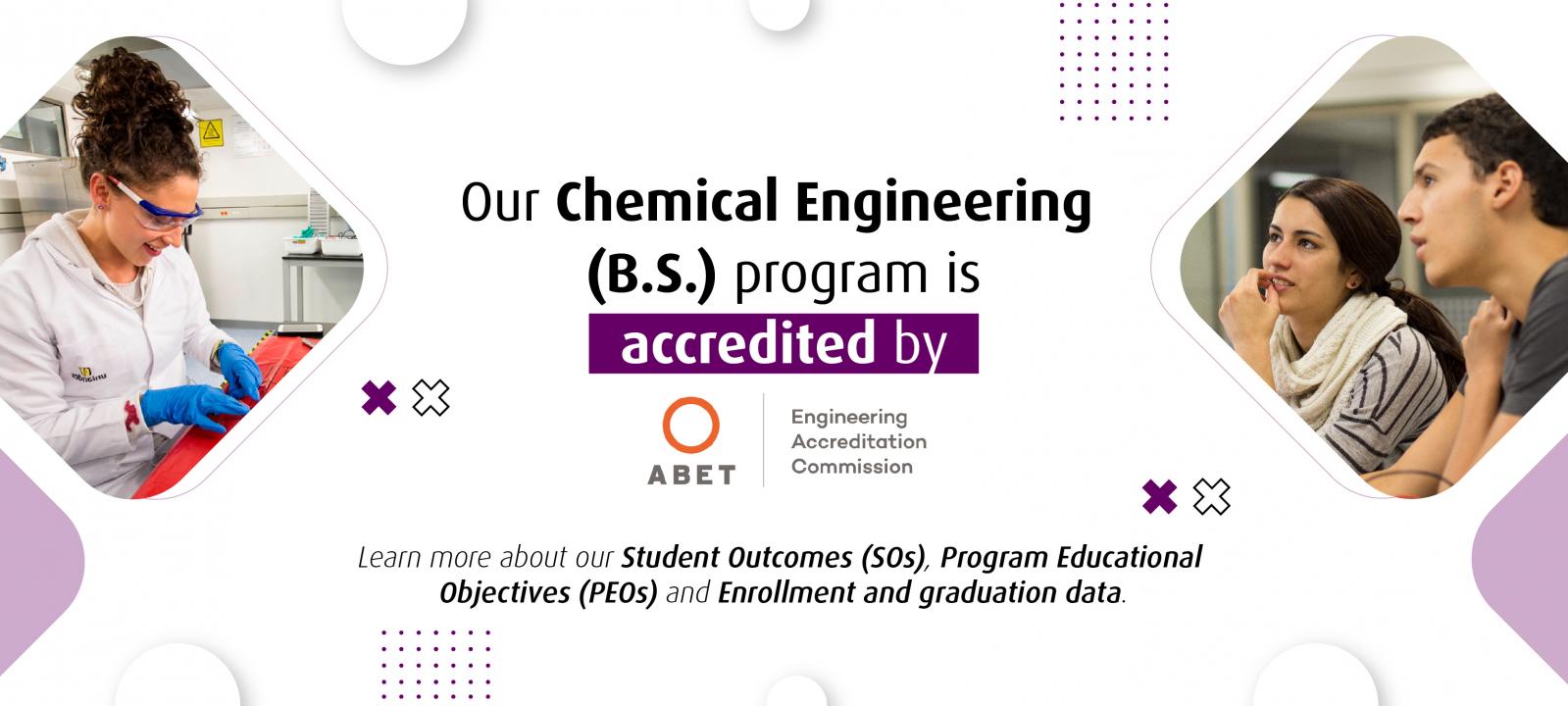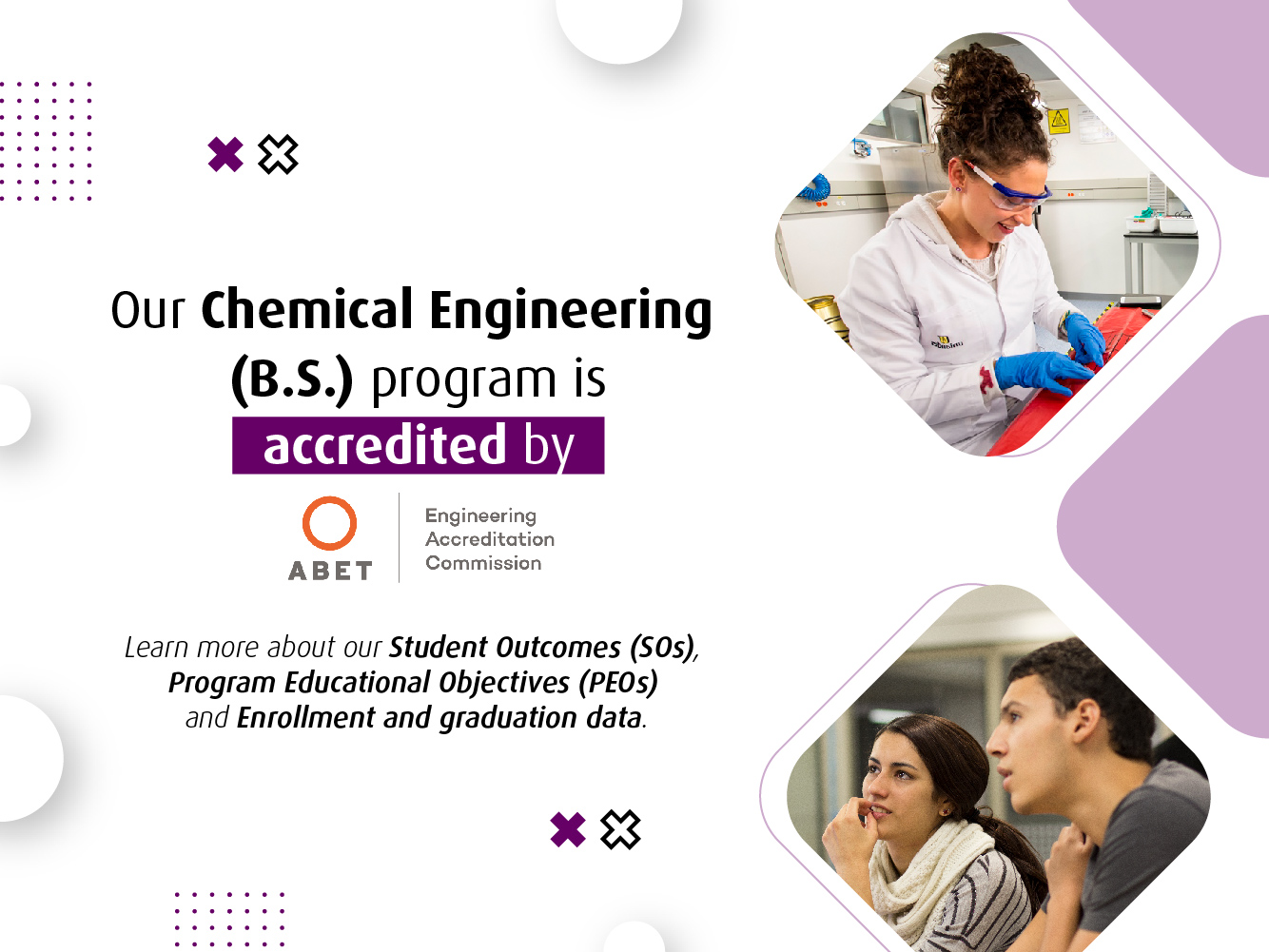Official Registration: Discharge Resolution 008232 from May 18th 2021 – for a 7-year period | SNIES (National Information System of Higher Education): 4017 | Program Length: 8 semesters | Presence-based modality.
Chemical Engineering has improved our quality of life for more than a century through the design of innovative products and processes. Chemical engineers have participated in developing new materials, technologies based on biological systems, treatments for diseases, environment protection, power generation technologies, and the optimization of renewable and non-renewable resources.
The Chemical Engineering Program B.S. is accredited by the ABET, under the General Criteria and the Program Criteria for Chemical, Biochemical, Biomolecular and Similarly Named Engineering Programs.
The Chemical Engineering (B.S.) is currently accredited by ABET which is a well-known nonprofit, nongovernmental agency that accredits programs in applied science, computing, engineering and technology. The standard ABET sets and the quality it has guaranteed for more than 80 years inspires confidence in those who aim to build a better world — one that is safer, more efficient, more comfortable and more sustainable.
Why ABET Accreditation Matters?
A quality education makes a difference for your professional future. Graduates from an ABET-accredited program have a solid educational foundation and are capable of leading the way in innovation, emerging technologies, and in anticipating the welfare and safety needs of the public.
The quality of education you receive makes a big difference in your career success. ABET accreditation:
• Verifies that your educational experience meets the global standard for technical education in your profession.
• Enhances your employment opportunities—multinational corporations require graduation from an accredited program.
• Supports your entry to a technical profession through licensure, registration and certification—all of which often require graduation from an ABET-accredited program as a minimum qualification.
• Establishes your eligibility for many federal student loans, grants, and/or scholarships.
• Paves the way for you to work globally, because ABET accreditation is recognized worldwide through international agreements, and many other countries’ national accrediting systems are based on the ABET model.
Program Educational Objectives (PEOs)
The Chemical Engineering undergraduate program of Universidad de los Andes takes actions aimed at its graduates so they:
1. Use chemical engineering principles creatively to design innovative solutions for society's problems linked to industry or research centers.
2. Integrate tools and methods to analyze and design sustainable products and processes at molecular to macroscopic scales by leading professional projects.
3. Approach engineering challenges and changing environments with respect, empathy, assertiveness, and effective communication in collaborative settings.
4. Demonstrate a high sense of responsibility, autonomy, breadth of thought, and ethical practice of the profession.
Student Outcomes (SOs)
The Chemical Engineering program of the Universidad de los Andes strives for students who have completed the proposed curriculum in the undergraduate program to have developed:
1. an ability to identify, formulate, and solve complex engineering problems by applying principles of engineering, science, and mathematics
2. an ability to apply engineering design to produce solutions that meet specified needs with consideration of public health, safety, and welfare, as well as global, cultural, social, environmental, and economic factors
3. an ability to communicate effectively with a range of audiences
4. an ability to recognize ethical and professional responsibilities in engineering situations and make informed judgments, which must consider the impact of engineering solutions in global, economic, environmental, and societal contexts
5. an ability to function effectively on a team whose members together provide leadership, create a collaborative and inclusive environment, establish goals, plan tasks, and meet objectives
6. an ability to develop and conduct appropriate experimentation, analyze and interpret data, and use engineering judgment to draw conclusions
7. an ability to acquire and apply new knowledge as needed, using appropriate learning strategies.
We want to enroll the best students in the country. All information regarding financing plans can be found at the Office of Financial Support website.
Pedro Navas Building
Carrera 1 Nº 18A – 19 first floor
Phone: 3324418
https://apoyofinanciero.uniandes.edu.co/
apoyofin@uniandes.edu.co
Dates and information about the registration and admission processes concerning undergraduate programs in the University can be found at:

